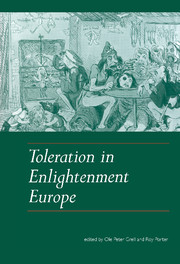Book contents
- Frontmatter
- Contents
- List of contributors
- Preface
- 1 Toleration in Enlightenment Europe
- 2 Toleration and the Enlightenment Movement
- 3 Multiculturalism and Ethnic Cleansing in the Enlightenment
- 4 Intolerance, the Virtue of Princes and Radicals
- 5 Spinoza, Locke and the Enlightenment Battle for Toleration
- 6 Toleration and Enlightenment in the Dutch Republic
- 7 Toleration and Citizenship in Enlightenment England: John Toland and the Naturalization of the Jews, 1714–1753
- 8 Citizenship and Religious Toleration in France
- 9 A Tolerant Society? Religious Toleration in the Holy Roman Empire, 1648–1806
- 10 Enlightenment in the Habsburg Monarchy: History of a Belated and Short-Lived Phenomenon
- 11 Toleration in Eastern Europe: the Dissident Question in Eighteenth-Century Poland–Lithuania
- 12 Toleration in Enlightenment Italy
- 13 Inquisition, Tolerance and Liberty in Eighteenth-Century Spain
- Index
9 - A Tolerant Society? Religious Toleration in the Holy Roman Empire, 1648–1806
Published online by Cambridge University Press: 03 February 2010
- Frontmatter
- Contents
- List of contributors
- Preface
- 1 Toleration in Enlightenment Europe
- 2 Toleration and the Enlightenment Movement
- 3 Multiculturalism and Ethnic Cleansing in the Enlightenment
- 4 Intolerance, the Virtue of Princes and Radicals
- 5 Spinoza, Locke and the Enlightenment Battle for Toleration
- 6 Toleration and Enlightenment in the Dutch Republic
- 7 Toleration and Citizenship in Enlightenment England: John Toland and the Naturalization of the Jews, 1714–1753
- 8 Citizenship and Religious Toleration in France
- 9 A Tolerant Society? Religious Toleration in the Holy Roman Empire, 1648–1806
- 10 Enlightenment in the Habsburg Monarchy: History of a Belated and Short-Lived Phenomenon
- 11 Toleration in Eastern Europe: the Dissident Question in Eighteenth-Century Poland–Lithuania
- 12 Toleration in Enlightenment Italy
- 13 Inquisition, Tolerance and Liberty in Eighteenth-Century Spain
- Index
Summary
In his essay of 1802 on the German constitution, Hegel commented that one of the many regrettable features of the Holy Roman Empire after 1648 was that it sanctioned the legality of intolerance. Paradoxically, the religious troubles of the sixteenth century and the Thirty Years War had strengthened the links between religion and the State. ‘Even civil rights are linked with religion’, he noted. Both Catholics and Protestants attempted to ‘exclude one another from civil rights and to gird and establish this exclusion with every kind of legal pedantry‘. Only Frederick the Great and Joseph II ‘put a higher value on freedom of conscience in religion than on the barbarity of legal rights’. Their toleration decrees contravened Imperial law but accorded with ‘the higher natural rights of freedom of conscience and the non-dependence of civil rights on faith’. These isolated acts, Hegel believed, pointed the way forward to the state of the future in which Church and State would be separated and man's conscience therefore truly free.
Hegel's comments place him on a watershed in the history of religious toleration in the German lands. He looked back on an era in which, since 1648, the rights of Catholic, Lutheran and Calvinist communities established before 1624 were guaranteed by Imperial law. For the rest, however, toleration was a precept of prudent government, an instrument used by rulers and magistrates to maintain political and social stability or to promote prosperity. Religious freedom was granted from above by decree; its beneficiaries remained in no doubt about the fragility of their rights.
- Type
- Chapter
- Information
- Toleration in Enlightenment Europe , pp. 175 - 195Publisher: Cambridge University PressPrint publication year: 1999
- 2
- Cited by

